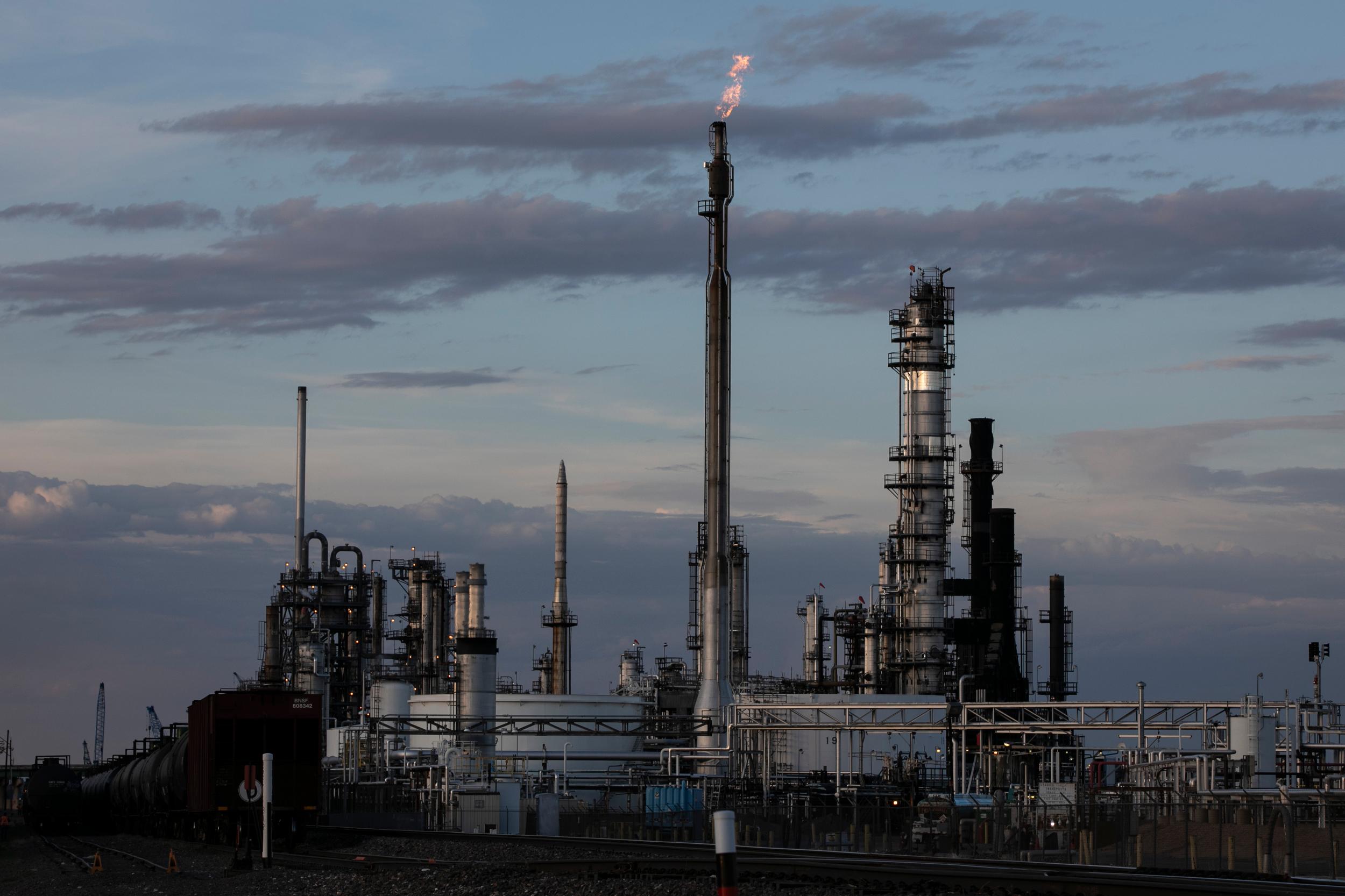
Ean Thomas Tafoya, an environmental organizer with GreenLatinos, believes there’s an ongoing pollution crisis at the Suncor oil and gas refinery in Commerce City, north of Denver.
You just can’t spot it.
On a recent afternoon, he stood at a stretch of Sand Creek bordering the facility. The area was alive with birds and cyclists zipping along an adjacent bike path. The occasional train made it too loud to talk, but there was no immediate sign of visible danger. Just a mashup of meadows and industry.
“At least with the smog, you can see it. With the flaring, we can see it,” said Tafoya. “I would say average people aren't really aware as much about water pollution because it's something that's invisible.”
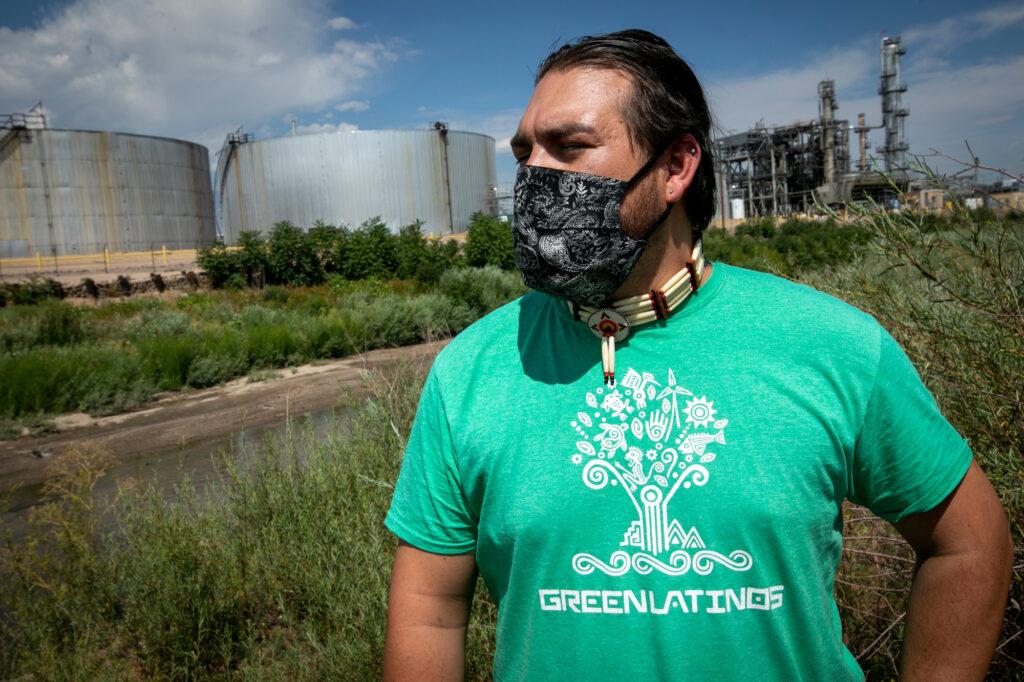
What concerns Tafoya is recent evidence Suncor is emitting high levels of per-and poly-fluoroalkyl substances, or PFAS, into Sand Creek. The potential toxins are a common ingredient in everything from nonstick pans to firefighting foam. A growing body of research suggests exposure can cause immune problems, pregnancy issues and kidney and liver diseases in animals. Other studies suggest a possible link to cancer.
A superstrong carbon-fluorine bond also means the chemicals almost never break down, and build up in the environment or in human bodies. That’s why many now refer to the substances as “forever chemicals.”
Since last summer, Suncor has complied with a state directive to test treated groundwater it pumps into Sand Creek for the chemicals. A letter state regulators sent to the company show the effluent often had PFAS concentrations far exceeding what the EPA recommends for safe drinking water.
According to one test from January, the levels of PFOS and PFOA, two of the best understood PFAS, combined to 199 parts per trillion. That’s almost three times the federal health advisory of 70 parts per trillion for drinking water. It’s seven times more than stricter levels recently adopted in New Hampshire.
Invisible But Not Surprising
An unseen pollution crisis would be a change of pace for Suncor.
The Canadian company owns Colorado’s only oil and gas refinery. The jungle of silver smokestacks and catwalks towers above the intersection of Interstate 270 and Brighton Boulevard in Commerce City, in clear sight of many of the poorest ZIP codes in metro Denver. Since the surrounding community is also largely Latino, the refinery has also become a symbol of environmental racism.
Over the last decade, the facility has earned a reputation for pollution incidents bordering on spectacle. Equipment failures have caused multiple releases of yellow smoke. Last December, schools went on lockdown after teachers noticed clay-like ash from the facility covering cars in the area. Those incidents and others led the company to pay $9 million to settle air quality violations last March.
The refinery’s problems with water pollution date back to the 1990s. Due to hydrocarbon spills and benzene pollution, the company began to pump up groundwater, treat it and release it into Sand Creek.
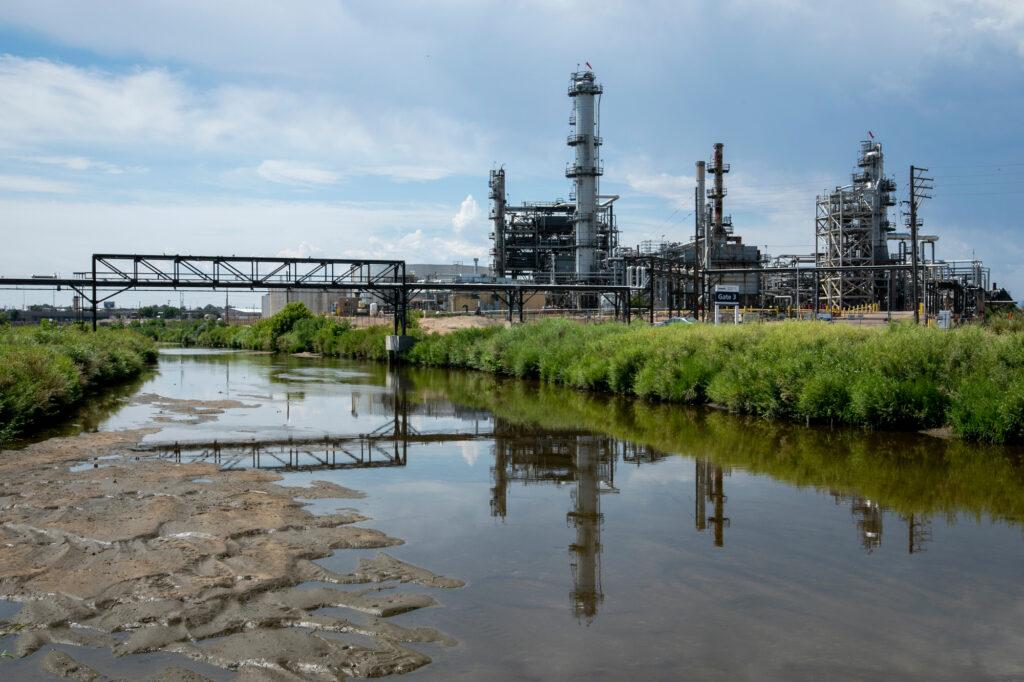
While the presence of PFAS in that water has not been reported until now, it was not a huge surprise to state regulators at the Colorado Department of Public Health and Environment. The refinery has long practiced firefighting at an onsite location. In a statement, Suncor spokesperson Erin Rees said the company believes the chemicals in groundwater comes from the historic use of Class B firefighting foam. She added the company has since replaced the foam with a new product in line with EPA recommendations.
“We will continue to work closely with CDPHE and other industrial sites and stakeholders to gather and share data so we can better understand the nature and extent of PFOS/PFOA in Colorado communities,” said Rees.
The news also follows a statewide survey commissioned by the legislature, which identified Suncor as a forever-chemical hotspot. The state conducted tests of 24 wells at the refinery between October 2018 and May 2019. The results found concentrations almost 150 times above the EPA health advisory.
That same survey included tests of surface water across the state. The only place where levels exceeded the threshold of 70 parts per trillion was the mouth of Sand Creek, just below Suncor.
Something In The Water
David Dani, the emerging contaminants coordinator with the CDPHE, said any finding of PFAS raises the same alarming question.
“Is there an impact to drinking water?” he said.
In addition to the statewide tests in 2018-2019, an earlier round of tests found PFAS in wells in Commerce City in 2018. Dani said at that point, local health officials contacted nearby homes with shallow groundwater wells. The campaign, conducted in English and Spanish, warned residents about potential contamination and determined no one was drinking unsafe water. According to Dani, despite the more recent findings of high PFAS levels in Suncor groundwater and Sand Creek, the results from residents' wells show, “we don’t have anyone drinking water above the health advisory."
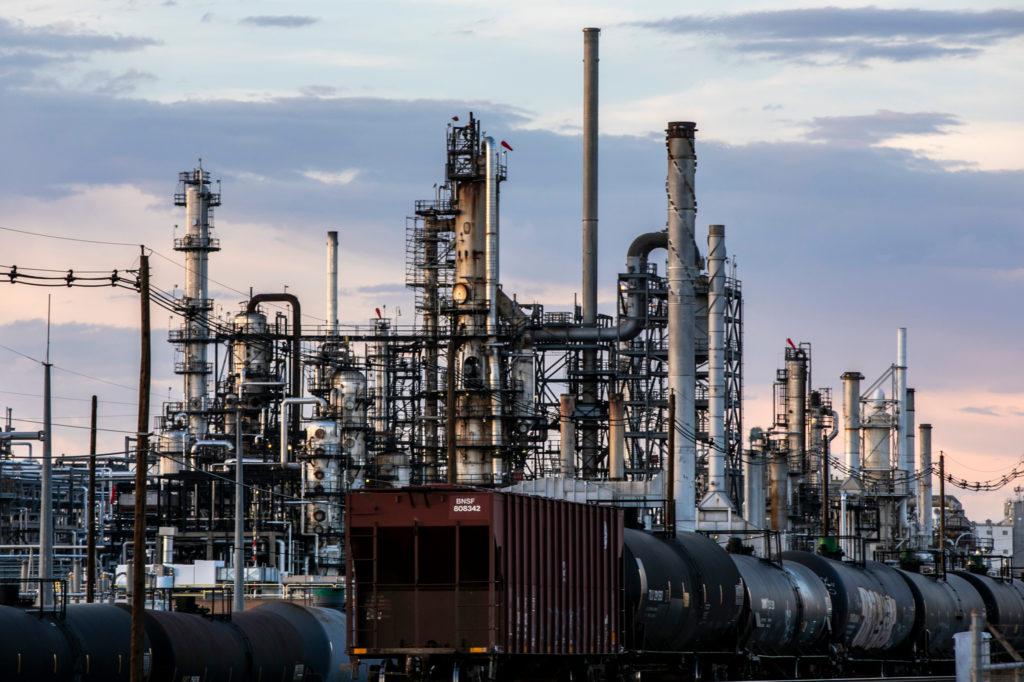
Kipp Scott, the manager of the South Adams County Water & Sanitation District, said the same can be said for municipal tap water. His system supplies water to more than 60,000 people in Commerce City and other parts of southern Adams County.
The district has worked to control PFAS in its water supply since 2018 when it found high concentrations in a dozen wells near I-270 and Quebec. The district disconnected three of the wells and purchased supplies from Denver Water to dilute what it sent to customers.
Following the incident, Scott said his district improved its water treatment practices and launched programs to conduct regular tests of the chemicals. Those results show water now sent to customers contains about 25 parts per trillion for PFOS/PFOA, below the health advisory.
Scott added he’s “reasonably sure” forever chemicals from Suncor aren’t affecting the water supply of its neighbors. That’s because most of the water supplied to the district comes from wells sunk into a different branch of the alluvial aquifer running beneath the district. Based on groundwater models, he said he has no reason to believe the chemicals at Suncor have reached the water supply.
A Coming Crack Down
Even if forever chemicals from Suncor aren’t affecting drinking water, it will likely affect the company.
Last week, the Colorado Water Quality Control Commission adopted the first state-wide limits on forever chemicals. The new policy was pushed ahead in the absence of federal regulation, which has lagged under complex EPA rulemaking and inaction from Congress. It allows the state to set limits for the chemicals in wastewater permits in line with the federal health advisory. If a company or wastewater district exceeds the limit, it could require water treatment or issue fines of up to $54,000 per day.
Meg Parish, permit section manager for the Water Quality Control Division, said Suncor’s permit is up for renewal next year and would be subject to the new policy.
“Looking at this latest data, we now have enough information and we’re continuing to get information to at least propose some limits for PFAS in Suncor’s next permit,” she said.
Rees, the spokesperson for Suncor, said the company is already exploring PFOS/PFOA treatment options as a part of its general efforts to improve water coming from the Commerce City facility.
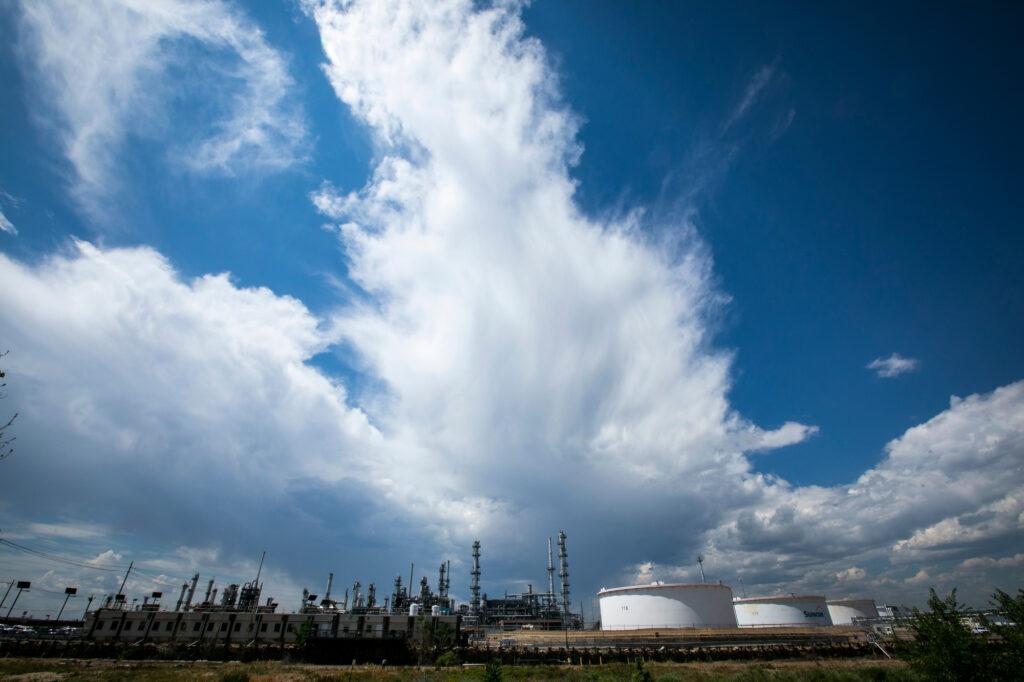
But the commitment from Suncor doesn’t put Olga Mijares at ease. The school administrator lives near the refinery and raised her three children in Commerce City. Like most people in the largely Latino community, she doesn’t drink the tap water but showers and cooks with it.
Her youngest son, who is 22 years old, has already battled thyroid and brain cancer. She said a doctor told her she would never know what was behind the conditions and to put it out of her mind, if possible. She said that gets a lot harder when she learns about any new pollution near her home.
“When you don’t have answers, you’re always wondering, was that the cause? Was that?” she said.
GreenLatinos organizer Ean Thomas Tafoya, who identifies as Chicano and Jicarilla Apache, said there’s tragic irony the latest problems center on Sand Creek. The name of the waterway recalls the Sand Creek Massacre when federal troops killed hundreds of Cheyenne and Arapahoe people southeast of Denver. While the event took place along Big Sandy Creek, a different waterway, he said “the significance is clear to Indigenous and Brown people.”
“Here we are, Brown people, who are being long-term exposure to toxic water and toxic air,” he said. “To us in the Indigenous community, to us in the Latino community, we see this as the same exploitation that's been going on for more than a hundred years.”
Editor's Note: A previous version of this story mistimed the campaign to warn residents with private wells about PFAS. It followed local water testing in 2018. Also, Colorado's recent PFAS water policy is the first state-wide policy regulating the chemicals, but there was an earlier policy for groundwater in the Widefield Aquifer. This story has been updated.








